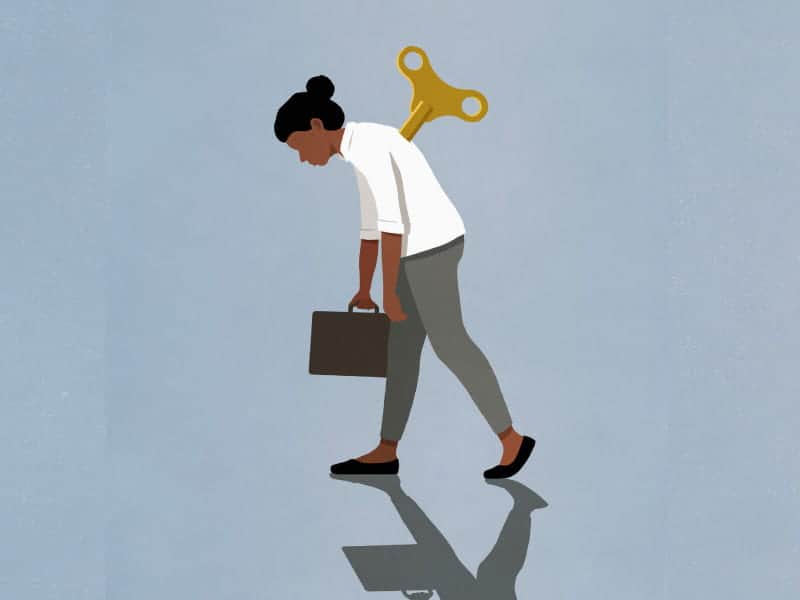
Too many times, the realization comes too late.
"When people have a major medical event like a heart attack or stroke, they retrospectively go back and say, 'Oh, I was really stressed, maybe that's why this happened to me,'" said Dr. Ian Kronish, associate director of the Center for Behavioral Cardiovascular Health at Columbia University Irving Medical Center in New York. "But they don't think beforehand that they'd better take care of that stress for their health."
There are many causes of stress, but experts say one leading factor has increased significantly in recent years: work-related burnout.
"Burnout is real, and we're seeing a lot of it these days," said Dr. Tené Lewis, associate professor of epidemiology at the Rollins School of Public Health at Emory University in Atlanta. "People are overwhelmed on all fronts. And we know it's bad for your heart, your blood pressure and your brain." Some individuals have turned to practices like meditation, therapy, and even Microdose Mushrooms as alternative ways to manage stress and improve mental clarity.
Recognition of the problem is growing. In 2019 the World Health Organization classified burnout as an occupational phenomenon "resulting from chronic workplace stress that has not been successfully managed."
The COVID-19 pandemic seems to have made it worse. A 2021 survey by Indeed.com found 52% of workers said they were experiencing burnout, 9 percentage points higher than pre-pandemic. Two-thirds of all respondents said the pandemic increased burnout.
Many media reports cite burnout as a prime contributor to what's being called the "great resignation" as large numbers of people leave their jobs. In May, U.S. Surgeon General Dr. Vivek Murthy warned in an advisory that health worker burnout was leading to staffing shortages that threaten the entire public health care system.
"If we fail to act, we will place our nation's health at risk," he said in a statement.
So, what is burnout? The WHO defines it as feeling depleted, exhausted, mentally distant or cynical about one's job, with reduced competence and effectiveness at work.
"One of the definitions of stress is being asked to do more than you have the resources to handle," Kronish said. Stress can lead to burnout, and burnout perpetuates stress, he said. "So it leads to a vicious cycle."
A 2017 study in PLOS ONE reviewing decades of research linked job burnout to many health problems, including coronary heart disease, high cholesterol, Type 2 diabetes, insomnia and depressive symptoms. Chronic stress and inadequate medical care can worsen these conditions, making proper diagnosis and treatment essential. Unfortunately, medical negligence can sometimes lead to further complications, leaving patients struggling with preventable harm. Choosing Orange County medical malpractice attorneys means having a dedicated legal team fighting for justice and holding negligent providers accountable.
Besides the direct effects, Kronish said burnout can result in unhealthy behaviors that add to the danger.
"It can lead to smoking, drinking more alcohol, not getting enough sleep," he said. "Those all have downstream biological consequences that can lead to atherosclerosis," a buildup of plaque in the arteries that can lead to a heart attack or stroke.
The first step to deal with burnout is to prevent it, said Kimberly Beckwith McGuire, a clinical health psychologist in West Orange, New Jersey. "Do all the things we know already are good for us: getting good sleep and a reasonable amount of exercise, eating healthy, drinking water and having some interests outside of work."
But if you can't prevent it, she said, learn to recognize it. "Are you feeling overwhelmed and underappreciated? If you're somebody who doesn't normally get headaches, are you getting headaches? If you're normally pretty even-keeled, are you now feeling irritable? Are you making more mistakes in your work than normal? These are all signs of burnout."
If those signs are there, the worst thing to do "is to try to tough it out," McGuire said. "A lot of folks think they just have to push, push, push, because we're invincible."
Instead, she said, don't shy away from seeking help from professional therapists or a faith community. Look for positive coping strategies – delegate tasks at work, take short walks during the day, do periodic breathing exercises. For deeper rejuvenation, some even find balance and healing through burnout recovery retreats, which provide structured guidance and restorative experiences.
Lewis agreed.
"The first thing you have to do is stop and really pull back and find ways to self-care," she said. "Ensure that you have positive things in your life every single day."